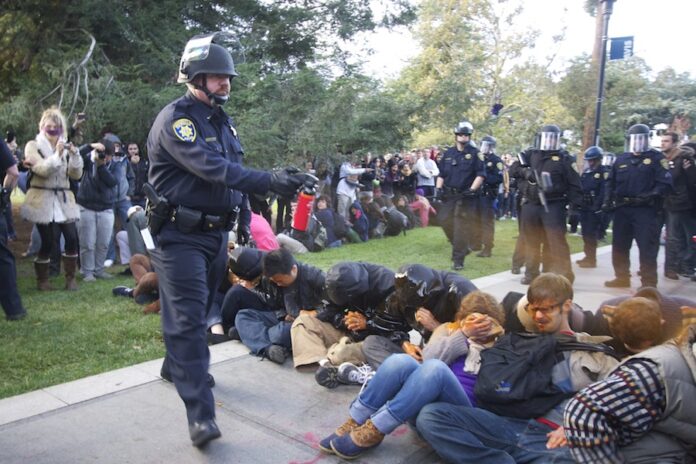Ten years after the incident, members of the UC Davis community discuss the impacts and the state of campus policing
By EMILY REDMAN — campus@theaggie.org
Ten years ago today on Nov. 18, 2011, UC Davis Police pepper sprayed a group of protesters on campus in what would come to be known as “the pepper spray incident.”
The students set up tents on the quad as a part of the Occupy Wall Street movement. When asked to leave by campus police, the protestors refused and an officer pepper sprayed the protesters.
Documents were obtained by The Sacramento Bee after the event that showed that the university had spent $175,000 to erase coverage of the incident that reflected negatively on UC Davis and the then Chancellor Linda Katehi.
Ten years later, UC Davis students and staff acknowledge the impacts these events left on the campus. Cops Off Campus is hosting an event on the Quad on Nov. 18 to remember the pepper spray incident and protest the continued police presence on campus. Beginning at 12 p.m., there will be coffee, music, art projects and other activities. These will continue until 4 p.m. when there will be a rally and march to close the event.
“Join UC Davis Cops Off Campus and a coalition of student and community organizations as we commemorate the 10th anniversary of the pepper spray incident, protest the ongoing violence caused by UC Davis Police, and fight to get cops off our campus for good!” a mass email sent to the study body from Cops Off Campus states.
According to Valeria Cantor Mendez, a second-year community and regional development major and a member of Cops off Campus, police presence on campus impacts the day-to-day lives of students. With UC Davis’ history of police violence, students and faculty are fighting for institutional change.
“We’re trying to show that this is a struggle that has been going on for such a long time,” Cantor Mendez said. “The people in power, like the chancellor, are not doing what we want them to do.”
In the past ten years, the UC Davis Police Department (UCDPD) has made adjustments to their approach to policing.
“Our philosophy has changed from doing things to people versus doing things for people,” Joseph Farrow, the chief of police at the UCDPD, said.
Since the pepper spray incident, UC Davis has appointed a new chancellor, new police chief and an entire new police force.
“More than half of my department now are students who graduated in the last couple of years,” Farrow said. “I think that’s a good thing because they understand the culture, they understand the campus.”
However, the changes in administration and leadership are not universally acknowledged as a sign of change for the better.
“So they have, for example, brought on a chief whose job it is to say, ‘We’re listening, we know we need to be better, we’re making big changes,’” Joshua Clover, a professor in the departments of English and Comparative Literature, said via email. “It’s hard to imagine anyone takes this seriously.”
Clover has been vocal about his position on abolishing the police presence on campus and said that the only change he has seen has been in the outward face of UCDPD and the stated desire to reform campus policing.
“We have no interest in public relations,” Clover said via email. “We have an interest in getting rid of this immediate danger to the community.”
Meanwhile, Farrow explained that UCDPD has adopted new philosophies that do not include police presence at protests.
“This is a learning institution,” Farrow said. “It’s freedom of expression, it’s freedom of speech, it’s freedom to gather. The role of the police in those types of incidents really shouldn’t exist.”
The department has been a role model in reforms for others across the UC system. The UC Office of the President (UCOP) made recommendations for police reform for UC campuses, some highlighting the work that UCDPD is doing.
“Our police accountability board and our international accreditation status […] takes standards to a higher level,” Farrow said. “It’s a very difficult process to achieve, but we’re the only UC around that actually achieved that status. The UCOP recommendation now requires [all UCs] to do that.”
On June 15, the Chancellor’s Task Force on Next Generation Reforms to Advance Campus Safety released a report with the Associated Students of UC Davis that outlined ways to evolve and update UC Davis policing.
Members of organizations such as Cops Off Campus, however, do not feel that the reforms that have been implemented or the task force have sufficiently addressed their grievances with UCDPD.
“There are organizations trying to do the work to bring awareness and to get people excited for this goal that we have to get cops off campus and to defund UCDPD,” Cantor Mendez said.
According to Farrow, the UC Davis campus continues to acknowledge the history and impacts of the pepper spray incident, and the police department continues to work for the students.
“Pepper spray is a wound that will never heal,” Farrow said. “But the police department that is here today, they are not responsible for that.”
Chancellor Gary May was contacted for comment on Nov. 11 but was not available at the time of publication. According to his communications team, students can expect a statement from his office near the date of the anniversary.
Written by: Emily Redman — campus@theaggie.org




